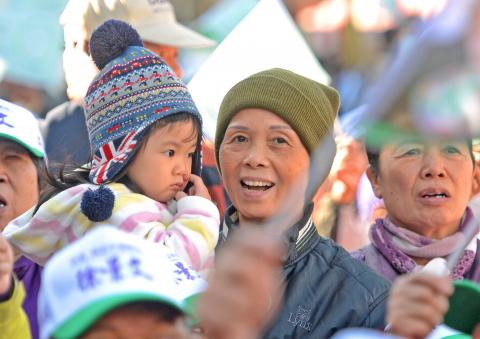Democratic Progressive Party (DPP) presidential candidate Tsai Ing-wen (蔡英文) yesterday called on the Chinese Nationalist Party (KMT) to stop selling its controversial party assets, questioning whether it is doing so to avoid supervision from the next legislature.
“The public should take this seriously. The KMT is trying to sell off its party assets before the legislative and presidential elections,” Tsai said in response to media queries while attending a campaign rally for the party’s legislative candidate in Taoyuan’s Jhongli District (中壢).
“I suspect that [the KMT] is selling the party assets with the intention of avoiding examination and supervision of the new legislature after the election and therefore I call on KMT Chairman Eric Chu (朱立倫) to refrain from selling party assets prior to the election of the new legislature and the passage of legislation on political parties and party assets,” she said.

Photo: CNA
Tsai was referring to advertisements published by the Chinese-language Commercial Times earlier this week that called for buyers for 26 plots owned by the KMT — three in Taipei, six in Taichung and 17 in Changhua — and for 80 percent of the shares of a hotel in Palau.
Tsai asked KMT presidential candidate Chu to clearly explain the funding of his and KMT legislative candidates’ campaigns, as the DPP did.
Chu should explain whether KMT assets have been used to fund election campaigns and how much has been invested so that voters have a basis for comparison between the two parties, Tsai said.
Speaking about the scheduled presidential debates, Tsai said she is glad the three parties have finally reached an agreement on the dates.
The presidential and vice presidential candidates’ debates have been scheduled with the first debate to take place on Saturday next week, the second on Dec. 27 and the third on Jan. 2.
“There will be three debates, and we are happy to have this opportunity to present our policies to voters around the nation,” Tsai said.
Tsai said that her aides would be working closely with debate organizers, while she and her team would be making their final preparations for the debates, adding that she has canceled some public appearances to prepare.
Tsai has been campaigning in Taoyuan and said that the situation is relatively more stable in southern Taiwan, so she would focus on regions where the support is relatively weaker, such as Taoyuan, Hsinchu, Miaoli and New Taipei City.
As for Jhougli, which has traditionally been a stronghold for the KMT, Tsai said that the support for the two parties is 50/50 and called on the voters to give the DPP a chance.

ANOTHER EMERGES: The CWA yesterday said this year’s fourth storm of the typhoon season had formed in the South China Sea, but was not expected to affect Taiwan Tropical Storm Gaemi has intensified slightly as it heads toward Taiwan, where it is expected to affect the country in the coming days, the Central Weather Administration (CWA) said yesterday. As of 8am yesterday, the 120km-radius storm was 800km southeast of Oluanpi (鵝鑾鼻), Taiwan’s southernmost tip, moving at 9kph northwest, the agency said. A sea warning for Gaemi could be issued tonight at the earliest, it said, adding that the storm is projected to be closest to Taiwan on Wednesday or Thursday. Gaemi’s potential effect on Taiwan remains unclear, as that would depend on its direction, radius and intensity, forecasters said. Former Weather Forecast

As COVID-19 cases in Japan have been increasing for 10 consecutive weeks, people should get vaccinated before visiting the nation, the Centers for Disease Control (CDC) said. The centers reported 773 hospitalizations and 124 deaths related to COVID-19 in Taiwan last week. CDC Epidemic Intelligence Center Director Guo Hung-wei (郭宏偉) on Tuesday said the number of weekly COVID-19 cases reported in Japan has been increasing since mid-May and surpassed 55,000 cases from July 8 to July 14. The average number of COVID-19 patients at Japan’s healthcare facilities that week was also 1.39 times that of the week before and KP.3 is the dominant

The Chinese Communist Party’s (CCP) working group for Taiwan-related policies is likely to be upgraded to a committee-level body, a report commissioned by the Mainland Affairs Council (MAC) said. As Chinese President Xi Jinping (習近平) is increasingly likely to upgrade the CCP’s Central Leading Group for Taiwan Affairs, Taiwanese authorities should prepare by researching Xi and the CCP, the report said. At the third plenary session of the 20th Central Committee of the CCP, which ended on Thursday last week, the party set a target of 2029 for the completion of some tasks, meaning that Xi is likely preparing to

US-CHINA TRADE DISPUTE: Despite Beijing’s offer of preferential treatment, the lure of China has dimmed as Taiwanese and international investors move out Japan and the US have become the favored destinations for Taiwanese graduates as China’s attraction has waned over the years, the Ministry of Labor said. According to the ministry’s latest income and employment advisory published this month, 3,215 Taiwanese university graduates from the class of 2020 went to Japan, surpassing for the first time the 2,881 graduates who went to China. A total of 2,300 graduates from the class of 2021 went to the US, compared with the 2,262 who went to China, the document showed. The trend continued for the class of 2023, of whom 1,460 went to Japan, 1,334 went to